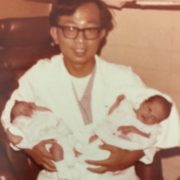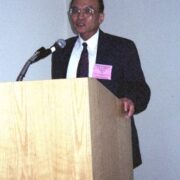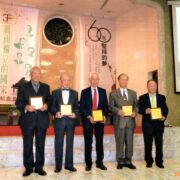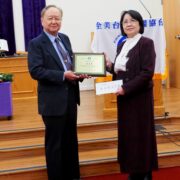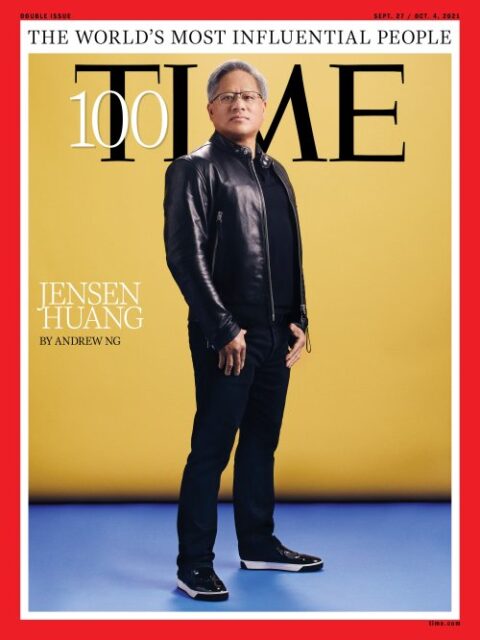My Life as a Doctor in the United States
Author: Che-yang Huang
{Harsher than Tigers} My father witnessed the February 28, 1947 massacre, known as the 228 incident, carried out by the KMT (Kuomintang nationalist party) with his own eyes. In the White Terror period of autocracy that followed he despised the KMT and felt that under the rule of the KMT Taiwan was no place to live. So, my four brothers and I were all sent abroad as soon as we graduated from college.
{Going Abroad} I graduated from medical school in June 1967. Then, on July 1st I started my year of mandatory military service, and when I was released on June 30th 1968, I immediately began resolutely preparing emigration procedures. At the time, first time travelers abroad had to first get approval from many offices, such as the Ministry of the Interior, Ministry of Foreign Affairs, and the Garrison Command, etc. On top of that there was the visa from the American Embassy. In all, the procedures took my one and a half months. There were rumors then that you could bribe one of the employees at the Ministry of the Interior so that he would take documents squeezed under the table and move them to the top of the pile, expediting the process. But I did not want to spend that kind of illicit money and be complicit in embezzlement and corruption. Everything was processed through the front door, step by step. By the time everything was arranged and I could fly to the Unites States, it was already August 19th, and my check-in day of July 1st had passed by a month and 19 days. I had been accepted to intern at Buffalo General Hospital. Fortunately, I had written a letter in advance explaining my situation and already obtained understanding for my late arrival.
{First Arrival in the United States} I took a Northwest Airlines flight with a flight time of 20 hours, starting from Taipei, then laying over in Hawaii, and finally transferring in Seattle for the flight to Boston. My older brother Chechang was working in Boston and he met me at the airport and took me to his place to rest for the night. Early the next day he drove seven hours to drop me off at Buffalo General Hospital for check-in. I met resident physician Dr. Richard Egan, the director of the internship program, and we exchanged some casual remarks. “Do you have jet-lag? ” he asked. I was young and had no problems sleeping; I had no idea what jet-lag was. “No,” I replied without thinking. “Great,” he said, “then you can report to work tomorrow.”
{Living Alone} I was placed in the doctor’s dormitory for singles, called Harrington House, opposite of the hospital. The room was tiny – only about 200 square feet with a bed a table and a closet. There was no kitchen, and the public restroom was outside. At the time the entirety of my belongings consisted of a suitcase of underwear, a jacket, and some books, plus the 400 US dollars my parents had given me. Though my annual salary was only 5000 dollars, I did not need to drive to work, housing was free, and I spent only 2-3 dollars per meal. For someone living alone, this was more than enough. My only difficulty was the food; there was an American-style buffet on the ground floor of the hospital, where I’d eat once in a while, but I couldn’t handle it daily. There was no Asian cuisine in the area either. There was just one fast-food restaurant run by a black man which served fried shrimp. They called it a “shrimp boat,” and it contained 6 tempura fried shrimp, a piece of bread, some fries and ketchup. This was more to my liking. At the time I was so tired of Western food that I would have been immensely satisfied with a simple bowl of white rice with soy sauce and lard.
{Finding my Way at the Hospital} Buffalo General Hospital was the teaching hospital of State University of New York at Buffalo (called UB). The hospital was located in a majority black neighborhood with poor public safety. In the emergency room there were often people with gunshot wounds and knife wounds brought in. In the evening when I had nothing to do, I didn’t dare step outside of the jurisdiction of the hospital because there were unsafe areas all around..
{Surviving in English} The most important work of the medical interns was doing the history and physical for all resident patients. – that is, getting their medical history and doing a physical examination and recording it in their medical record. Naturally, it was important to speak English. During my first three months I barely dared open my mouth in English. In high school in Taiwan I had learned English for six years, plus one more year in college. After 7 years of English I had a foundation, and had no problem reading and writing, but I had had little opportunity to practice speaking and lacked confidence. But I had to bite the bullet with on the job training, and during those three months gradually got used to communicating in English. And after six months I could already answer fluidly. The American nurses were very patient with the language difficulties of the new foreign doctors. They talked slowly and seldom showed signs of impatience. For the most part their upbringing was to not publicly embarrass others, and the nurses all respected the doctors.
{Medical Intern} Besides conducting history and physicals, my daily job consisted of doing check-up rounds of all patients together with the resident and attending doctors and carrying out tasks. We were on shift one out of every three days. The primary task during night shift was to look after the urgent needs of resident patients, such as fevers, sudden rises or drops in blood pressure, sudden stops in breathing or heartbeat, intravenous injections, difficulty urinating, difficulty sleeping, etc. I had experience with all of this from interning at the National Taiwan University Hospital, so I had no difficulty with the medical side of my work, especially since I could ask for help from higher-up doctors. Aside from the initial language barrier, my first year in the United States passed without a hitch.
{Loneliness} Half of the interns at the hospital were from the area and half were international students. Of the international interns, I was the only Taiwanese, and the rest were all from Iran, Peru, Japan, and Korea. The American interns had nearly all married early and did not live in the single’s dormitory, so during my free time I only had contact with the international interns living in the dormitory. Yet there was still a cultural barrier, and I felt lonely as the sole Taiwanese. I wanted to change to another hospital in the same city – Sister of Charity Hospital. There were many Taiwanese doctors there, with two senior graduates from NTU in the OB-GYN ward: Dr. Justin Chuang class of1962 and Dr. James Chen class of 1963.
{Choosing Obstetrics and Gynecology} Before my term as an intern was up I had to consider what medical department I’d want to serve as a resident physician because I’d have to apply several months in advance. I felt that in internal medicine there were too many chronic diseases that could not be cured. In surgery there were many startling and disturbing injuries like knife wounds and car accident injuries. In pediatrics it would be difficult to communicate, and the crying children were too noisy. Everywhere in the hospital was full of distress. Only the birthing delivery room was an exception – there you could share the joy of new life brought into the world with the patient. And for difficult births, with a c-section you could save the lives of both mother and baby. This kind of dramatic effect was what led me to OB-GYN. So, I applied to be a resident physician in the OB-GYN department at Sisters of Charity Hospital. With the recommendations of seniors from my alma mater, I was soon accepted. From then on, I was bound to my life’s profession.
{A resident Gynecologist} Training of OB-GYN residents included gynecology and obstetrics. Obstetrics training consisted of observing the progress each mother during labor, such as the width of dilation of the uterus, the position of the baby’s head and whether it was facing down, and whether the baby’s heartbeat was regular. When it was close to the time of delivery, I would notify the attending physician to come deliver the baby. If there were problems during delivery like unstable progress, improper positioning of the baby, slowing heartbeat, excessive blood loss etc., we would assess immediately and ask the attending physician to decide on next actions. Most of the time it was resident physicians who delivered the baby during birth; the attending (private) physician would observe and direct, ensuring everything was proceeding as it should. C-sections or gynecological surgeries were the same – attending physicians had plentiful experience and did not need to practice surgery so they gave residents opportunities to practice as much as possible. This is the common practice in most teaching hospitals – it is the best way to ensure a next generation of skilled young doctors. Of course, us residents had to perform well so the attending physician would have confidence in us and let us take care of patient’s surgeries. If there was an error during surgery, it would be the attending physician who would be responsible. The hospital also had an OB-GYN outpatient clinic staffed by resident doctors (with attending physicians guiding us by our side). Every day we had a morning meeting to discuss the special cases from the previous day. Once a week we also held a discussion of journal articles, presented by residents and guided by attending physicians. As such we were trained up, and after four years I became a professional obstetrician-gynecologist myself, confident at being able to take care of any miscellaneous incident that might come up.
{Marriage} When I was interning at the ophthalmology ward of National Taiwan University Hospital, I had set my eyes on a nurse with big eyes called Showmei Yeh. She seemed very warm and always had on a friendly smile – anyone who saw her would immediately feel at ease. At the time I was moved to pursue her but couldn’t muster the courage. Once I wrote my phone number on the blackboard in the nurse’s station during night shift, suggesting she should come find me. But she couldn’t decode my meaning. I waited foolishly in the shift room for her call that never came. Later, I transferred to another department and had no more opportunities. I could only keep this melancholy unrequited love hidden in the bottom of my heart. When I ran into her next, I was interning at Buffalo General Hospital – I was visiting Chibo Chen’s house when we met by chance. When I suddenly saw her there, I thought I was in a dream. She was serving as a nurse in Toronto at the time and had come to Buffalo to visit her friend (Chen Chibo’s wife) for the weekend. When we met that time we hit it off from the start. I was so surprised, it felt just like “But in the crowd once and again, I look for her in vain. When all at once I turn my head, I find her there where lantern light is dimly shed” (line from Yuan dynasty poem),[1] – had God sent her to me in the darkness? It certainly felt like a “godsend”, for our feelings developed quickly and we got married 8 months later. It was a marriage of destiny. From then on, I have had a warm family; we later gave birth to one son and one daughter who both became doctors when they grew up. By now they have both formed families and established their careers. At New Years and other holidays they bring their whole family to visit – son and daughter plus daughter-in-law, son-in-law, and three grandchildren. With nine of us in total our household becomes lively and rambunctious. This is a whole new world from when I first arrived in the United States all alone with only a single suitcase.
{Naturalization} My first U.S. visa was a J1 visa, which is a visa for exchange students. Usually after five years you must leave and reapply for entry. But in the 1970s many young American doctors were selected to go to Vietnam for the war – hospitals and private practitioners alike had a shortage of doctors, so the U.S. government gave third priority to exchange-student doctors, allowing us to apply directly for a PR (permanent residency). After having a PR for five years, we all became American citizens. From then on, we were Taiwanese Americans – loyal to the U.S. but with hearts bound to Taiwan.
{Staying in Buffalo} After interning in Buffalo for one year, followed by four years of being a resident practitioner, I had already become an experienced OB-GYN and thought about settling down somewhere to open my practice. But considering that I had to take the exam from the American Board of Obstetrics and Gynecology in two years, it was perhaps better for getting a professional license that I stay in the teaching hospital and raise my academic performance in this academic atmosphere. So, I temporarily stayed in Sisters of Charity hospital as a coordinator for resident doctors. I could make a difference and still have an easy life, and in 1975 I successfully obtained my diploma from the American Board of Obstetrics and Gynecology. In those days, life was very comfortable, and though I hadn’t yet found a permanent position, I was too lazy to initiate change. Two more years passed in this state, up until a huge blizzard came to Buffalo in 1977. It lasted for days and the snow piled up to the roof. Temperatures dropped to negative 56 degrees with wind chill factor. I realized we could not stay here forever and decided to move to the land of eternal sun – California.
{Moving to California and working with a Jewish Doctor} In 1977 when I moved to California it was responding to an advertisement from a clinic run by a Jewish gynecologist. He was Dr. F from Montclair Doctors’ Hospital, a highly influential person. He had control over the whole hospital, like the mafia – even the director had to listen to him. He was money-loving but lazy – he never wanted to help with childbirth and only did gynecology work and surgeries, so I became in charge of all deliveries. I worked hard and was soon very busy. After I’d worked with him for one year, he was very satisfied with my performance and wanted me to extend my contract and become his partner. The clinic was flourishing because of my effort, yet he wanted me to pay for half of the clinic – 175 thousand dollars. I thought this was unreasonable. Furthermore, working with such a strong-willed person I would inevitably get stepped on. I was confident I could run my own practice, so I refused to sign on with him. But he was the mafia of Montclair Hospital, so refusing him would inevitably cause difficulties. In the end I left his field of influence and went to neighboring Upland to start my own clinic at the San Antonio Hospital in Upland.
{Starting my own Business} My clinic in Upland was opened in 1978, and was busy right from the start. Patients were treated with courtesy regardless of whether they were rich or poor, and no one was refused. I put my soul into looking after every patient, especially the many Mexican patients from the area who had an especially high birth rate because they were Catholics and did not use contraception or abortions. For many years I was the doctor who delivered the most babies out of the 30 or so OB-GYN doctors at San Antonio Hospital. My performance in the hospital was not bad either and I won the respect of nurses and colleagues – many of the patients who came to me were their wives. The director of the OB-GYN department was elected by colleagues, and I was elected as director for two terms. At that time I was very close to the center of power in the hospital because as a branch director you automatically became a member of the hospital executive committee and would often have meetings together with the hospital president and other branch directors. But I was not so interested in hospital politics and just wanted to take care of my business, so I did not continue to serve. From 1977 when I first moved to California till my retirement in 2006, I must have delivered around 10,000 babies, and I lost count the number of operations performed. Perhaps I exerted myself too much so that I was already burnt out at age 65. Until that year I still had to get up at night for deliveries – it was truly taxing, and I gradually began to lose interest and patience. I started to become irritated just hearing the telephone ring – I had completely lost my dogged enthusiasm from when I first started up. It was about time to retire.
{Prison Doctor} In the 1980’s I was in the California Institute for Women (a prison) for up to five years. I was not doing time – I was serving as an obstetrician. Working there, on the one hand I could witness the lives of patients of a different social class, and on the other hand I could expand my business. All the women who required surgeries I sent to Riverside General Hospital; resident doctors there belonged to the Loma Linda University training program, and I advised their surgery procedures as the attending physician. Having the fortune of being able to link up with a university and serve as an educator of students and resident doctors was its own kind of joy.
{Cultural Activities} During my OB-GYN career in Southern California I had to be on call 24-7. I carried a beeper with me, and if a patient was expecting, I could not go too far from the hospital. At most I would wait at home (7-8 minutes away), or I would simply wait in the hospital. Though I was very busy, a lot of that time was actually spent waiting. I did not want to waste this time, and I had loved reading and writing for fun since I was young, so I got some paper and practiced writing some essays. Then it was just random scribbles with no clear topic – I wrote whatever was on my mind. Sometimes I recalled events of childhood, and sometimes I wrote down random ideas, such as questions of the two sexes or of religion. I was obsessed with Strange Stories from a Chinese Studio as a child, so I used all manner of stories I had picked up plus fruits of my own wild imagination to write similar stories. I did not publish any of my writings; I just stored them in a drawer. In 1988 writer and artist Mr. Futung Wang asked me and a few other doctors to raise funds to set up a magazine called Great Earth, but it went bankrupt after 9 months. However, that experience taught me how to edit and compile a magazine. In 2005, the Board of Directors of the Southern California Branch of the North American Taiwanese Medical Association appointed me to edit the annual journal of the Medical Association because I had editing experience. Since then, I have compiled nine consecutive issues, and I have also written some articles intermittently, published in the Pacific Times or some annual journals. In 2016 I compiled these essays into a volume, printed as a book called The Two Sexes (男女兩性). This title was borrowed from one of the essays in the collection and also based on a recurrent theme – the writings of a gynecologist were often related to sex and gender.
{Life in Retirement} I retired in 2006. To keep healthy, I focused on physical activity, taking daily walks, and playing tennis weekly. I have joined the North American Taiwanese Medical Association (NATMA) several times on medical missions to Panama, Guatemala, Nicaragua, Belize, and other places for volunteering at free clinics. I also served at the Tzu Chi Free Clinic for several years, assisted Professor Siya Yeh to organize the Taiwanese-American Religious Studies Association, established and continued to help promote the affairs of the Kaohsiung High Schools Alumni Association (KHSAA), and contribute effort and time to volunteer for various public projects. Additionally, I participate in a monthly life discussion forum and accompany my wife to sing in a chorus every two weeks. Being able to partake in so many beloved activities has made my life in retirement happy and fulfilling.
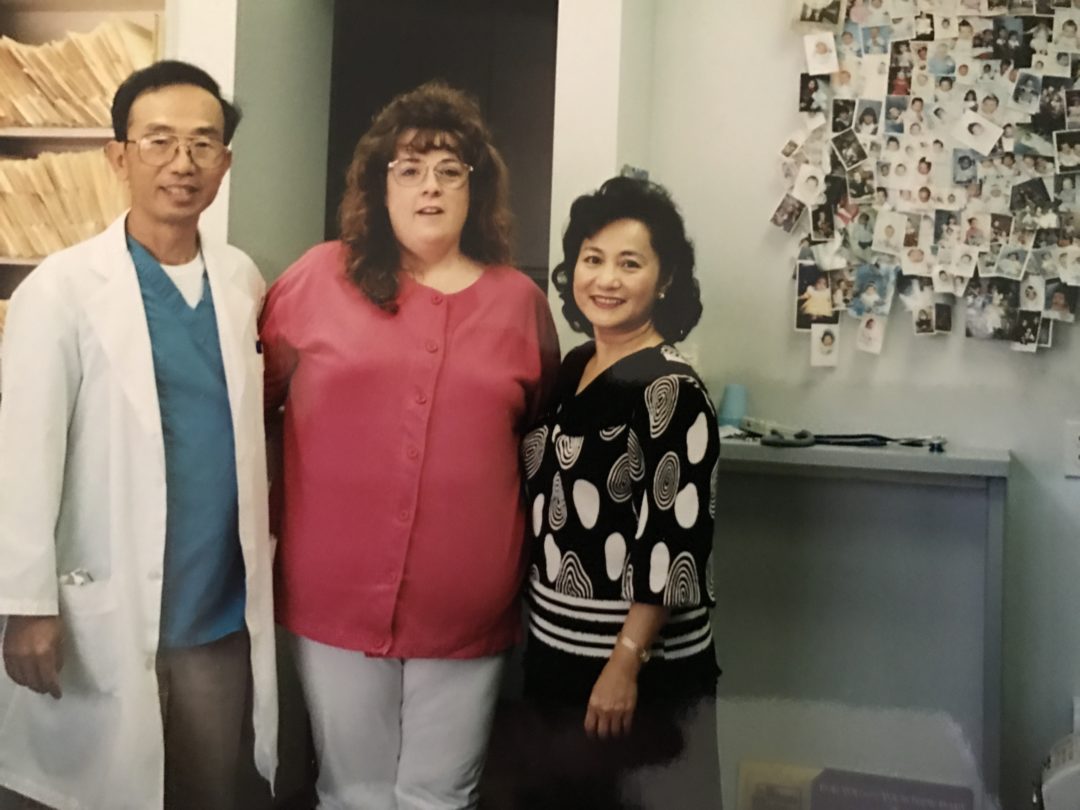
Author in his office with wife and secretary
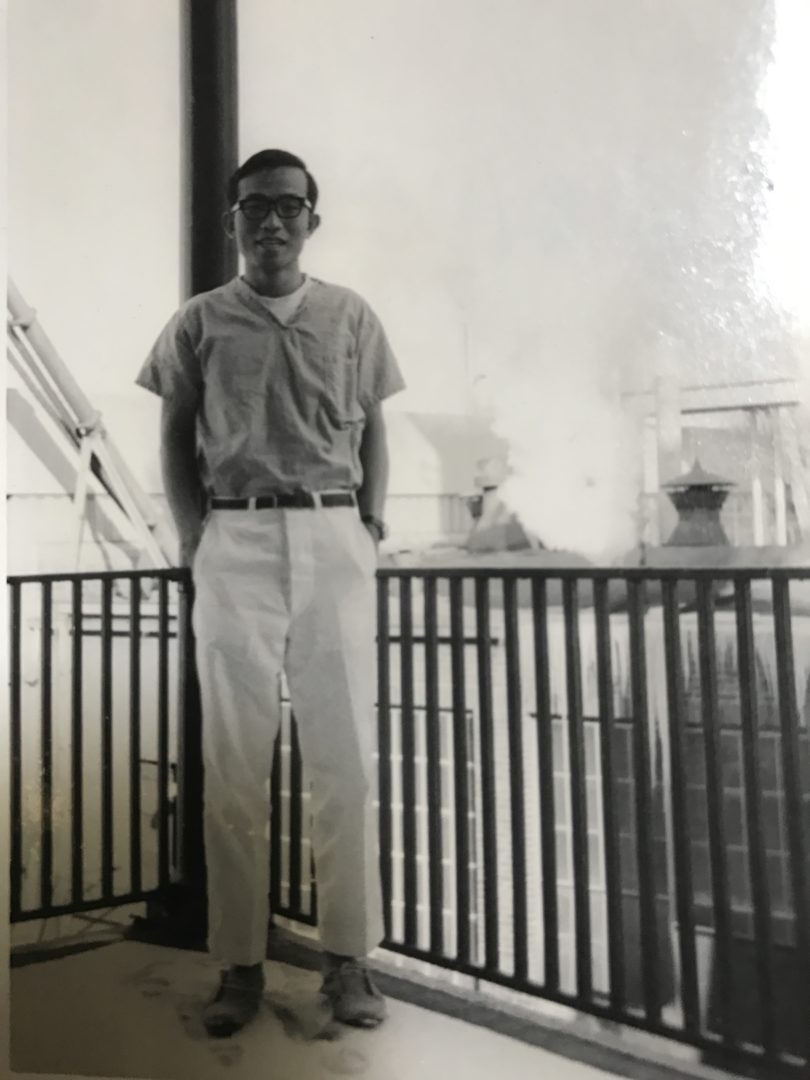
Intern at Buffalo General Hospital 1968
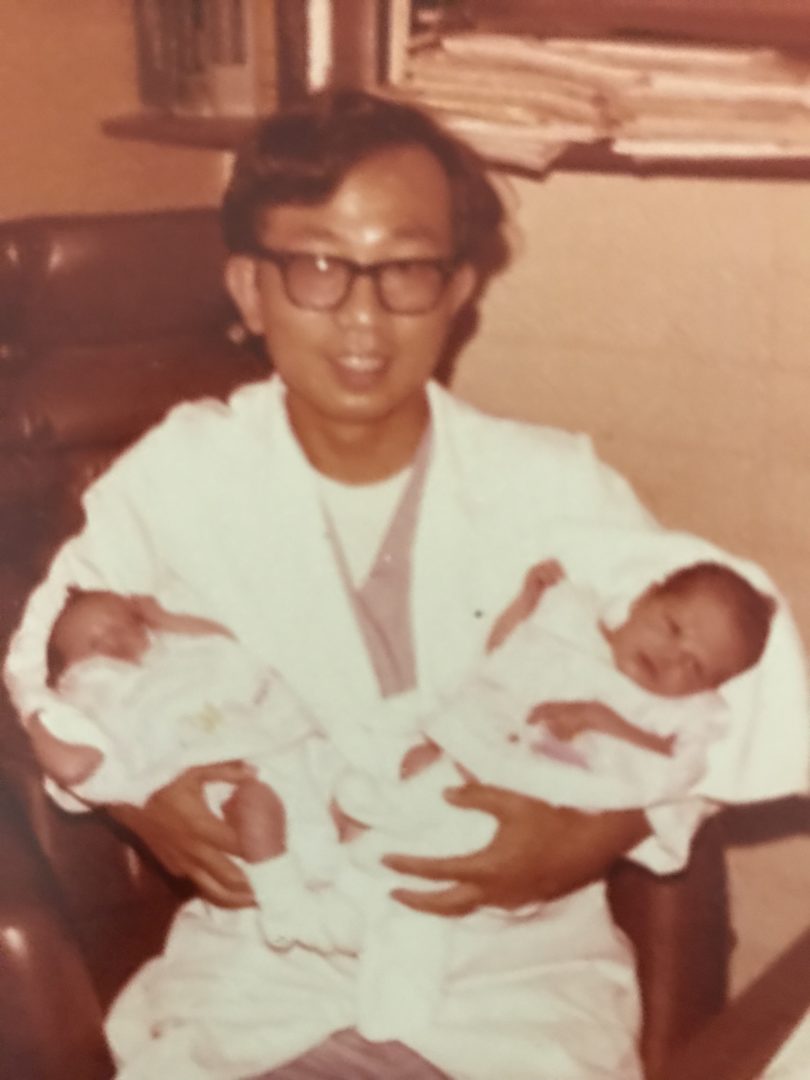
Sharing the joy of having twins with patients
[1] Original by Xin Qiji: 眾裡尋她千百度,驀然回首,那人卻在燈火闌珊處, translated by Xu Yuanchong (许渊冲), Xu Ming(许明)
Source from 黃哲陽 02/2017
Translated from 518. 我的美國醫師生涯 / 黃哲陽 /02/2017 by Sky Ford, posted 11/20

